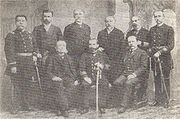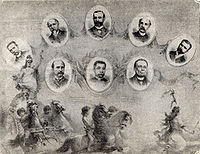.gif)
Government Junta of Chile (1891)
Encyclopedia

Chile
Chile ,officially the Republic of Chile , is a country in South America occupying a long, narrow coastal strip between the Andes mountains to the east and the Pacific Ocean to the west. It borders Peru to the north, Bolivia to the northeast, Argentina to the east, and the Drake Passage in the far...
an President José Manuel Balmaceda
José Manuel Balmaceda
José Manuel Emiliano Balmaceda Fernández was the 11th President of Chile from September 18, 1886 to August 29, 1891. Balmaceda was part of the Castilian-Basque aristocracy in Chile...
following the insurrection of the navy that started the Chilean Civil War
Chilean Civil War
The Chilean Civil War of 1891 was an armed conflict between forces supporting Congress and forces supporting the sitting President, José Manuel Balmaceda. The war saw a confrontation between the Chilean Army and the Chilean Navy, which had sided with the president and the congress, respectively...
. It ruled the country until Admiral Jorge Montt
Jorge Montt
Jorge Montt Álvarez was vice-admiral of the Chilean Navy and president of Chile from 1891 to 1896.-Early life:...
assumed power as the new President after the defeat of President Balmaceda.
Creation
A conflict had been simmering for a long time between the National CongressNational Congress of Chile
The National Congress is the legislative branch of the government of the Republic of Chile.The National Congress of Chile was founded on July 4, 1811...
and the President
President of Chile
The President of the Republic of Chile is both the head of state and the head of government of the Republic of Chile. The President is responsible of the government and state administration...
over the extent of the constitutional powers of each. In January of 1891, the conflict led to the Chilean Civil War
Chilean Civil War
The Chilean Civil War of 1891 was an armed conflict between forces supporting Congress and forces supporting the sitting President, José Manuel Balmaceda. The war saw a confrontation between the Chilean Army and the Chilean Navy, which had sided with the president and the congress, respectively...
, that broke out between the presidential and the congressional forces. President José Manuel Balmaceda
José Manuel Balmaceda
José Manuel Emiliano Balmaceda Fernández was the 11th President of Chile from September 18, 1886 to August 29, 1891. Balmaceda was part of the Castilian-Basque aristocracy in Chile...
was supported by the regular army and a small part of the navy. Most of the navy, under the command of captain Jorge Montt
Jorge Montt
Jorge Montt Álvarez was vice-admiral of the Chilean Navy and president of Chile from 1891 to 1896.-Early life:...
, supported Congress. Captain Montt, who also led the congressional forces together with General Emil Korner
Emil Körner
Emil Körner Henze was a scion of Prussian military tradition brought to Chile and Commander-in-chief of the Chilean Army with the rank of Inspector General from 1900 to 1910.-Army modernization plans in Chile:...
, captured the northern provinces and organized a parallel government in the city of Iquique
Iquique
Iquique is a port city and commune in northern Chile, capital of both the Iquique Province and Tarapacá Region. It lies on the Pacific coast, west of the Atacama Desert and the Pampa del Tamarugal. It had a population of 216,419 as of the 2002 census...
. Once there they proceeded to raise and organize an army, which eventually they transported south to fight against the presidential forces.
Members
| Position | Name | Background | Notes |
| President | Jorge Montt Alvarez Jorge Montt Jorge Montt Álvarez was vice-admiral of the Chilean Navy and president of Chile from 1891 to 1896.-Early life:... |
Navy Captain | |
| Member | Waldo Silva Algüe | Vice President of the Senate President of the Senate of Chile The President of the Senate of Chile is the highest authority of the Senate of Chile. The position comes after the Ministers of State in the line of succession of the President of Chile in the case of temporary incapacitation or vacancy .... |
|
| Member | Ramón Barros Luco Ramón Barros Luco Ramón Barros Luco was President of Chile between 1910 and 1915.Barros Luco was born in 1835 in Santiago, Barros Luco was son of Ramón Luis Barros Fernández and Dolores Luco Fernández de Leiva. He graduated from Law School in 1858... |
President of the Chamber of Deputies Chamber of Deputies of Chile The Chamber of Deputies of the Republic of Chile is the lower house of Chile's bicameral Congress. Its organisation and its powers and duties are defined in articles 42 to 59 of Chile's current constitution.... |
|
History

Tierra del Fuego
Tierra del Fuego is an archipelago off the southernmost tip of the South American mainland, across the Strait of Magellan. The archipelago consists of a main island Isla Grande de Tierra del Fuego divided between Chile and Argentina with an area of , and a group of smaller islands including Cape...
, close to the Straits of Magellan and the Falkland Islands
Falkland Islands
The Falkland Islands are an archipelago in the South Atlantic Ocean, located about from the coast of mainland South America. The archipelago consists of East Falkland, West Falkland and 776 lesser islands. The capital, Stanley, is on East Falkland...
, and thence carried to Iquique, where they were safely disembarked early in July 1891. A force of 10,000 men was now raised by the junta, and preparations were rapidly pushed forward for a move to the south with the object of attacking Valparaiso and Santiago, because in a few months the arrival of the new ships from Europe would reopen the struggle for command of the sea so the Congressional party could no longer aim at a methodical conquest of successive provinces, but was compelled to attempt to crush the dictator at a blow.
After his forces were overcome, Balmaceda fled to the Argentinian embassy where he stayed for one month, then committed suicide
Suicide
Suicide is the act of intentionally causing one's own death. Suicide is often committed out of despair or attributed to some underlying mental disorder, such as depression, bipolar disorder, schizophrenia, alcoholism, or drug abuse...
rather than surrender to the new government. The Government Junta took control from General Manuel Baquedano
Manuel Baquedano
Manuel Jesús Baquedano González was a Chilean soldier and Chief of Government, who served as Commander-in-chief of the Army during the War of the Pacific. Manuel Baquedano was of Basque descent.-Early life:...
, who had succeeded President Balmaceda in order to avoid the continuance of hostilities, and ruled until new elections were held, that elected Captain Montt as new President.
See also
- History of ChileHistory of ChileThe territory of Chile has been populated since at least 2,000 BC. By the 16th century, Spanish conquistadors began to subdue and colonize the region of present-day Chile, and the territory became a colony from 1540 to 1818, when it gained independence from Spain...
- List of Government Juntas of Chile
- List of Heads of StatePresident of ChileThe President of the Republic of Chile is both the head of state and the head of government of the Republic of Chile. The President is responsible of the government and state administration...

